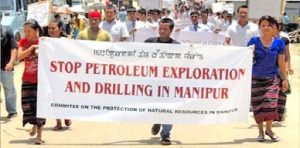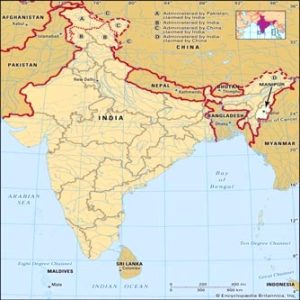
Imperialist Roots of Deadly Ethnic Conflict in Manipur
Garment Worker Says: “It Is Communism or Endless Violence”
INDIA, July 30—”You cannot go to bed tonight without massively distributing Red Flag,” declared a comrade. “Manipur is like Kashmir and Afghanistan combined. We only have a communist revolution to build by eliminating all the capitalists and imperialists.”
This comrade was among several dozen ICWP members who gathered for a forum. The atmosphere was charged, as the news was filled with stories about the heinous rape of two women by a mob of thousands. The Chief Minister, controlled by the ruling party BJP, admitted that there were hundreds, perhaps thousands, of such cases.
Not a single newspaper, TV channel, or social media report explained why such atrocities are leading to ethnic cleansing in Manipur. These bosses’ media reported only that a recent High Court order declared the majority Meitei community a Scheduled Tribe (giving it a preferential treatment in government jobs and land acquisition). Previously only the Kukis, who lived in the mountains, enjoyed this status. After the court order, the Kuki community feared encroachments.
Three ICWP members detailed the real root of the deadly conflict. They explained how only communism can resolve it by smashing wage slavery that divides workers and promotes hate.
British Imperialism Was Behind This Conflict
In the early 19th century, the British East India Company discovered wild tea growing in northeast India (part of Manipur). Seeking an alternative to tea from China, they bribed a local king to produce tea commercially, using local tribes as wage labour.
Tea plantations grew quickly. The massive production of tea for export to Great Britain prevented the tribes from growing food for their sustenance. The Assam Rifles military unit was formed to enslave wage slaves of the tea gardens and to protect the British tea plantations.
The Assam Rifles became an occupying force. Then they discovered timber in the foothills. The commercial production of timber, used in shipbuilding, became the backbone of the British navy.
British colonial administrators used different tribes for tea plantations and timber production. They promoted different languages, religions, ethnicities to divide the working class. These newly created ethnic and tribal divisions intensified wage competition. The British introduced Christianity to create a docile work force that would accept capitalism.
The discovery of oil completed colonial plunder. British imperialism set its sights on Myanmar, Thailand, and China, using northeast India as a gateway. Manipur was considered the crown jewel of India.

World War II: Japanese Imperialists Challenge Britain
In 1944, fascist Japanese forces tried to invade Imphal, Manipur’s capital. They planned to use it as a staging point to conquer all of India but suffered a disastrous defeat. Twenty-six thousand soldiers, from both sides, died in the battle.
But Britain emerged from the war greatly weakened. India became independent. But it inherited more insurgency as many workers, attracted by the success of the 1949 Chinese revolution, took up arms against the Indian army.
The Chinese Communist Party made many advances in defeating the vastly superior imperialist army. But it failed to advance to communism by ending wage slavery. That brought back capitalism and nationalism.
This directly affected northeast India. Over 300 nationalist and self-proclaimed ‘communist’ groups now fight each other in Manipur alone. Many are from neighbouring Myanmar which is under Chinese influence. The Indian Army has deployed over 46 battalions of the Assam Rifles and various Counter Insurgency and Counter Terrorism military forces to brutally suppress the local population.
Oil and Natural Gas Fuel Ethnic Crisis in Manipur
Early estimates suggest that Manipur is sitting on five trillion cubic feet of oil, worth several trillion dollars. There is an even bigger prospect of finding natural gas, vast number of mineral resources, and timber. These are all found in the Kuki area.
Mining, oil and gas exploration, and timber are going to devastate Manipur, a fragile and biodiverse area already rocked with frequent earthquakes. Oil spills into pristine rivers have already poisoned the local population, very much like what has happened in Peru, Ecuador, and the Niger delta.
In 2010, the Indian government started oil production in thirty areas. It gave Jubilant Oil and Gas of the Netherlands exclusive rights to a 3,000 km2 area.(about 1150 square miles). The ownership of natural resources is contentious in Manipur. That’s the root of the problem in Manipur. Different ethnic groups want to be classified as Scheduled Tribes to claim the ownership of the land.
Garment Workers Inspired to Organize for Communism
“Now I clearly understand why there is killing in Manipur,” said a garment worker. “For more than 300 years, ethnic hatred was created for profit. It has devastated the working class and it is threatening to damage natural resources.
“So many garment workers I know are from Bangladesh, without papers,” she continued. “They know what is happening in Manipur. They fear for their life as the Indian government is targeting us. I was afraid of approaching these women, but I am going to take them Red Flag on Monday.”
“We need to fight for communism, not each other” said another comrade. She had seen the ghastly images of rapes and knows that capitalism is responsible for degrading women. “Today it is Manipur. Yesterday it was the sexual abuse of athletes. There was the horrible case of Bilkis Bano, who was gang raped. There was the burning of a Dalit girl who was raped in Hathras. The list goes on. It is communism or endless violence.”
A comrade commended the three presenters, saying, “We need to talk more about communism and how it is going to abolish wage slavery.” This opened a big discussion about what holds us back from organizing communism, because everyone thinks that communism is better for us. Somebody said, “We like communism, but I feel it is a distant dream, capitalist forces are too powerful.”
“If you read Red Flag, bring your friends to our meetings, recruit them to the party, it will give you a different idea,” a comrade answered. “It is not only possible, but Red Flag groups around the world are struggling for the same cause. In India, a country of 1.4 billion people is looking for us. Capitalism looks intimidating because its mass media force-feed the masses with poisonous ideas. We can change it now.”
Our forum continued for several hours. The participants grabbed Red Flag. Everybody wants to talk about Manipur. It is our opportunity to present our communist struggle and recruit the masses.

Manipur protests, 2012

